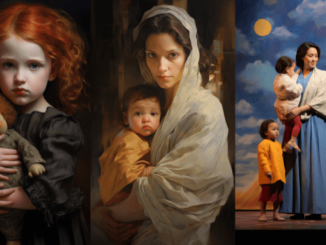
One of Ludogogy’s (very) regular contributors, Thomas Ackland wrote an article for this issue, way back in March, before it was postponed. He then developed his thoughts over the intervening months, and sent us another one on the same topic. This is the second version. You can find Part I here.
I don’t really think I’ve ever had the chance to properly document the reasons why I have spent a vast majority of my life working towards being a games designer and why games matter to me, and to have the chance to actually share this with an audience of lovely readers is a pretty cool experience. With that being said, I hope you find it an enlightening or at the very least entertaining read into my personal history with games.
It all started with games…
Some of the earliest of memories that I can remember involving games would be playing games such as Wario Land, Tetris and Pokemon on the family Game Boy and Saturn Bomberman and the Lost Vikings 2 on the Sega Saturn. Additionally, me and my siblings would also take over the family PC to enjoy games such as Age of Empires, Theme Park World, The Sims, Dungeon Keeper and Black and White. Steadily moving onto the first 2 Playstation consoles with game series including Crash Bandicoot, Ape Escape, Klonoa and Dark Cloud to past the time before getting my hands on the Nintendo Gamecube, thanks to my friend showing me Super Smash Bros. Melee, Super Mario Sunshine and the Legend of Zelda: The Wind Waker.
I eventually got my hands on a Nintendo Wii to share with the family along with an Xbox 360 so that I could enjoy some of the latest titles the gaming world had to offer, introducing me to the world of online gaming thanks to Call of Duty and Halo game series on the Xbox as well as discovering the realm of MMORPG’s with World of Warcraft on the PC.

I could be here all day adding to my unreasonably long back catalogue of games but I’ll just leave you with the knowledge that I’ve currently got a PS4, a 3DS, a large library of PC games on my Steam library and a handful on my phone, not to mention a constantly evolving collection of Yu-Gi-Oh and Magic the Gathering cards and board games. If you name a game, chances are I’ve played it or heard of it in one way or another, but why is this important to getting into the mind of this rather eclectic young man?
Well random rhetorical question asker, playing games was both my hobby and my coping mechanism whilst growing up with high-functioning autism and having little to no interest in conventional activities that other kids my age were taking part in such as music, art or sports and always gave me something to use in order to connect with other people that I interacted with.
This led to me managing to make like-minded friends who introduced me to other forms of media such as TV shows, cartoons and movies as well as helping me break out of my comfort zone and try new interesting physical activities such as Go-karting, Bowling and Laser-tag whilst also introducing me to games that I may not have heard of, thus feeding my hobby even more!
Forming my career path
I think it’s safe to say that I am rather fond of games and whilst brushing up my grades at college, I discovered that they offered a Games Development course I leapt at the opportunity and had an enlightening 3 years learning the basics of art, programming and designing games, with the opportunity of flying to Japan for the Tokyo Game Show (aside from the jet lag from a 12 hour flight…it was amazing!). This didn’t stop there, with me spending the next 4 years studying Games Design and Development at the University of Greenwich, primarily focusing on the design side of things including; Sound, User Experience and Interface Design.
I also learned more about Serious Games which completely changed my preconceptions on what games could achieve in the educational, medical and rehabilitation sectors and provides a vastly different experience that found along the likes of conventional educational games such as Reader Rabbit or Mavis Beacon.
In a nutshell, serious games are products that are tailor made to solve problems that the client and designers wishes to solve within an interactive and entertaining way. The goal of these games could range from a broad audience, providing adjustable motion-controlled minigames intent on assisting in the training of patients with low motor skills to games that are intended for a very specific purpose, like a game that tests the knowledge of doctors who specialise in prenatal resuscitation.
During my 3rd year, I managed to acquire a work placement in Milan, Italy with the serious games company Imaginary SRL and work on these rather specific examples as a consultant games designer. To say that this trip was an enlightening experience would be a gross understatement, especially since it was the first time that I’d moved away from my family home and country (go big or go home eh?), I managed to learn conversational Italian despite never learning the language before and it was the first taste of working within the games industry and I can safely say that I want be involved with more of these kinds of projects, serious games or otherwise.

How Games Design has shaped who I am
I firmly believe that I don’t think that I would be the person that I am today if I hadn’t taken the extra step to learning more about how games are designed and developed. This is most likely due to me believing that there is no entirely useless knowledge as being a game designer is all about creating experiences of all kinds, meaning that it is important to be at least familiar with almost all things that can be found or experienced within reality, whilst also keeping an open mind to trying new things and ideas I may not have originally come up with myself (especially in the world of food…why didn’t anyone tell me tasting things tasted so good?).
This open-mindedness has also been useful when I’ve had to work with teams as I although am comfortable with making decisions and directing people, I’m more than happy to concede the leadership role for someone who is more knowledgeable or competent than I am while I take on more of a supportive role within the team. I also make it a point to make sure that everyone on the team has some form of input in the current task (inclusion is important after all).
Outside of my professional setting, having an open minded approach has actually improved my ability to socialise and connect with people in both social and professional settings by actually focusing my attention to the interests of the people I’m talking to and then leading the flow of the conversation to those interests or to subjects that are similar to them (very handy if you’re not 100% sure about what to talk about with someone).
All in all, contrary to the common stereotype of gamers not being social, I’d like to think that it’s thanks to games that I’m the outgoing, albeit slightly cheeky social butterfly that I am today who’s always on the lookout for new and interesting experiences.
I think I’ll finish up here but thanks for reading this rather verbal barrage about my character origins and if you ever want to chat, I’m always about on Linkedin or other avenues of communication (I’m sure Ludogogy has my email tucked away somewhere), might even break the ice with a game of Magic if you fancy it.
But for now, I’ll leave you with both a fun picture I took at an MC Escher exhibition I found in Milan as well as a quote from Lorewalker Cho, a wise old Panda from World of Warcraft that I think captures how I try to view life:
“Eyes open, always be learning”.
- Observing how games teach players to think and plan ahead - 12th March 2021
- Learning about systems using games. - 15th January 2021
- Focus on… Wargaming and Wargames - 8th November 2020





Be the first to comment